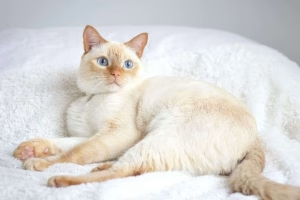Cats have long been adored for their unique personalities and diverse appearances. Occasionally, some cats exhibit unusual physical traits or behaviors that lead people to wonder if they have a condition akin to Down syndrome in humans. While “Down syndrome cats” is a popular term online, it is crucial to understand the science and reality behind this concept.
Can Cats Have Down Syndrome?

The short answer is no—cats cannot have Down syndrome. Down syndrome is a genetic condition caused by the presence of an extra copy of chromosome 21 (trisomy 21) in humans. Cats, however, have only 19 pairs of chromosomes and cannot develop the same condition.
Why Do Some Cats Look Like They Have Down Syndrome?
Certain cats may display physical or behavioral traits that resemble Down syndrome, such as:
- Wide-set eyes.
- Flattened faces.
- Small or misshapen ears.
- Unusual gait or difficulty walking.
- Cognitive or developmental delays.
These traits can result from a variety of factors, including:
- Congenital Defects: Birth defects caused by genetic mutations or environmental influences during development.
- Infections or Illnesses: Viral infections in a pregnant cat, such as feline panleukopenia, can lead to physical and neurological abnormalities in kittens.
- Trauma or Injury: Head trauma or neurological damage can cause behavioral or physical changes that mimic Down syndrome-like traits.
Conditions That May Mimic Down Syndrome in Cats
While cats cannot have Down syndrome, there are several medical conditions that can produce similar symptoms:
- Cerebellar Hypoplasia: A neurological condition that affects coordination and balance, often resulting in a wobbly gait.
- Hydrocephalus: Excess fluid in the brain, which can cause an enlarged head, wide-set eyes, and cognitive impairments.
- Feline Dwarfism: A genetic mutation leading to smaller stature, flattened faces, and other physical abnormalities.
- Genetic Syndromes: Certain rare genetic disorders in cats can result in unusual physical and behavioral traits.
Caring for Cats with Special Needs
Cats with physical or neurological conditions require extra care and attention to ensure their well-being:
- Regular Veterinary Care: Schedule routine check-ups to monitor their health and address any medical issues.
- Safe Environment: Create a cat-proof space free from hazards that could pose a risk to a cat with mobility or sensory challenges.
- Dietary Needs: Some cats with special needs may require specific diets to maintain their health.
- Enrichment and Stimulation: Engage your cat with toys and activities that are suited to their abilities, helping them stay mentally stimulated.
Why the Myth Persists

The idea of “cats with Down syndrome” has gained popularity due to social media platforms showcasing cats with unique appearances. These cats often attract attention and love for their distinctiveness, leading to misconceptions about their condition. While they may not have Down syndrome, their unusual traits make them endearing to many.
Famous Cats That Sparked the Myth
Several famous cats with distinctive looks have fueled the belief in Down syndrome-like conditions in felines:
- Monty: A cat from Denmark with a flat nose bridge and unique facial structure, Monty became an internet sensation for his sweet personality and one-of-a-kind appearance.
- Lil Bub: Known for her perpetual kitten-like face, Lil Bub had a rare genetic mutation that caused dwarfism and other physical abnormalities.
- Grumpy Cat: While not related to Down syndrome, her iconic frown was caused by feline dwarfism and an underbite.
How to Support Cats with Special Needs
Adopting or caring for a special needs cat can be a rewarding experience. Here’s how you can help:
- Adopt from Shelters: Many cats with unique appearances or special needs are overlooked in shelters.
- Advocate for Awareness: Educate others about the true causes of physical and behavioral differences in cats.
- Support Online Communities: Join forums and groups that celebrate special needs cats to learn more and share experiences.
Key Takeaways
Understanding that cats cannot have Down syndrome but may display similar traits due to other conditions helps dispel myths and encourages informed care. Every cat, regardless of their physical or behavioral differences, deserves love, compassion, and proper medical attention.
Frequently Asked Questions
Can cats have a genetic disorder similar to Down syndrome?
No, cats cannot have Down syndrome, but they can have other genetic conditions that cause unique traits.
Are cats with special needs harder to care for?
They may require extra attention, but with proper care and patience, they can lead happy, fulfilling lives.
How can I tell if my cat has a medical condition?
Consult a veterinarian if your cat displays unusual physical traits, behaviors, or developmental delays.
The concept of “cats with Down syndrome” is a misconception rooted in the unique appearances and behaviors of certain cats. While these felines cannot have Down syndrome, their distinct traits often result from other medical conditions that require understanding and care. By educating ourselves and others, we can ensure that all cats—regardless of their differences—receive the love and support they deserve.
Silly cats bring endless joy and laughter to our lives, whether they’re chasing their tails, playing with boxes, or knocking objects off tables. Their antics remind us to find happiness in life’s little moments and cherish the unique personalities of our feline companions. Celebrating their silly behavior not only strengthens our bond with them but also enhances our own well-being.




